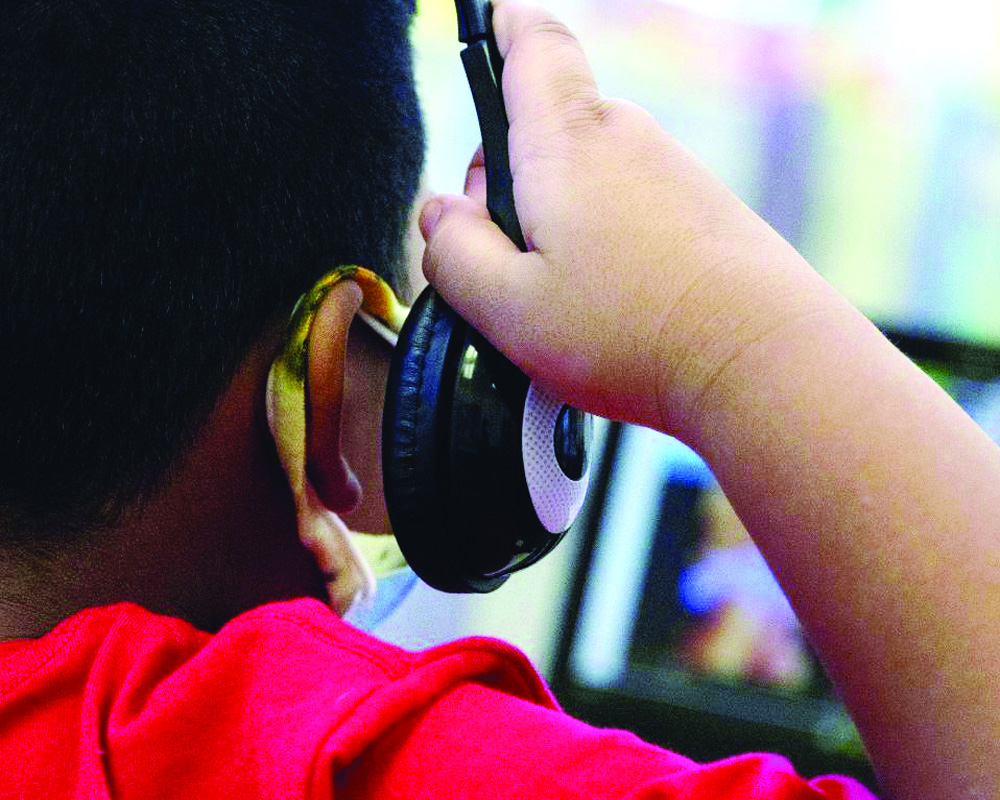A global study warns that young children, whose ears are still growing, are more at risk from loud noises. This exposure could lead to problems like hearing loss or ringing in the ears called tinnitus. Archana Jyoti delves into this issue further.
Scene 1
Parent: “I’ve noticed something concerning lately, dear. You’ve been using your headphones a lot, both at school and at home. I’m worried it might not be great for your ears. What do you think?”
Child: “I like using my headphones, Mom/Dad. They help me focus and block out distractions.”
Parent: “I understand, but too much of a good thing can sometimes have drawbacks. Let’s talk about how we can make sure your ears stay healthy while still enjoying your music and videos.”
Scene 2
Parent: “You know, I’ve noticed a lot of kids using headphones these days to keep busy. It’s become pretty common, especially for parents who are always on the go. But here’s the thing, while it’s great for keeping you entertained, we need to be careful about your hearing health too.”
Child: “But everyone uses headphones, Mom/Dad. It’s not a big deal.”
Parent: “I get that, but sometimes what everyone does isn’t always what’s best for them. Did you know that too much time with headphones can actually hurt your ears?”
Child: “Really? I didn’t know that.”
Parent: “Yes, it’s true. Your ears need to be taken care of just like the rest of your body. Let’s figure out together how we can keep you entertained while still making sure your ears stay happy and healthy.”
These are just two ways how parents can delicately approach their kids to tackle the issue of rampant usage of headphone and earbuds.
With understanding, education, and clear boundaries, parents can help their children develop healthy listening habits that will benefit them in the long run, say psychologists.
In fact, while it’s not surprising to spot teens wearing headphones and earbuds, it’s becoming a widespread trend among younger children, as suggested by a US national poll.
Two in three parents said their child aged 5-12 uses personal audio devices, with half of parents of children aged 5-8 reporting elementary-aged kids use a device. Among parents whose children use headphones and earbuds, half say kids spend at least an hour a day using them, while one in six say a typical day for their child includes at least two hours of use, according to the University of Michigan Health CS Mott Children’s Hospital National Poll on Children’s Health.
“Over recent years, we’ve mostly been concerned about teens overusing audio devices. But earbuds have become increasingly popular and prevalent among younger kids, exposing them to more intense noise regularly,” said Susan Woolford, Mott pediatrician and co-director of the Mott poll. “Noise exposure risks to young children have historically involved loud singular events like concerts or fireworks, but parents may underestimate the potential harm from excessive use of listening devices. It may be difficult to know whether their child’s exposure to noise is healthy.”
Children are most likely to use these devices at home, school, and in the car, report findings show. About a fourth of parents also said children occasionally use audio devices on airplanes while less than 10% said kids use them on the bus, outside, or in bed. Half of parents agreed that headphones or earbuds help keep their child entertained.
Prolonged or extreme exposure to high volumes of noise can result in long-term health issues, including hearing loss or tinnitus. About half of the population between the ages of 12 and 35 is at risk of damaged hearing because of loud sounds, warns the World Health Organization.
“Young children are more vulnerable. Their auditory systems are still developing. Their ear canals are also smaller than adults, intensifying perceived sound,” Woolford said.
“Tiny hair cells inside the inner ear pick up sound waves to help you hear. When these get damaged or die, hearing loss is irreversible.”
Noise exposure among children can also affect their sleep, academic learning, language, stress levels, and even blood pressure, she added.
Here’s how parents can effectively tackle headphone/ earbuds issues:
Open Communication: Start by having an open and honest conversation with your child about their headphone use. Approach the topic with care and understanding, letting them know your concerns without sounding accusatory.
Educate: Take the time to explain to your child the potential risks associated with excessive headphone use, such as hearing loss and tinnitus. Use age-appropriate language and real-life examples to help them understand why it’s essential to be mindful of their listening habits.
Set Limits: Establish clear guidelines for headphone usage, including time limits and volume levels. Encourage your child to take breaks from using headphones and to alternate between different activities throughout the day.
Lead by Example: Children often mimic their parents’ behavior, so make sure to model healthy headphone habits yourself.
Explore Alternatives: Encourage your child to explore alternative forms of entertainment that don’t involve headphones, such as playing outside, reading books, or engaging in creative activities. Help them discover new ways to enjoy music and audio content without relying solely on headphones.
Monitor and Adjust: Keep an eye on your child’s headphone use and be ready to adjust your approach as needed.
Be mindful of early signs of hearing loss
- If parents feel their child may be at risk of hearing loss due to using audio devices, check with a pediatrician, an audiologist, or an ENT (ear, nose, and throat) specialist.
- Early signs of hearing loss may include asking for repetition, hearing ringing noises often, speaking loudly to people nearby, delayed speech, or lack of reaction to loud noises.
- Healthcare providers may be of assistance to parents by offering a simple explanation about hearing loss to help the child understand the reasons for limiting


























